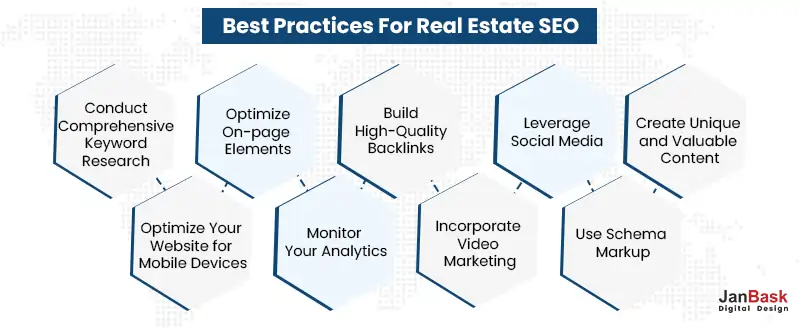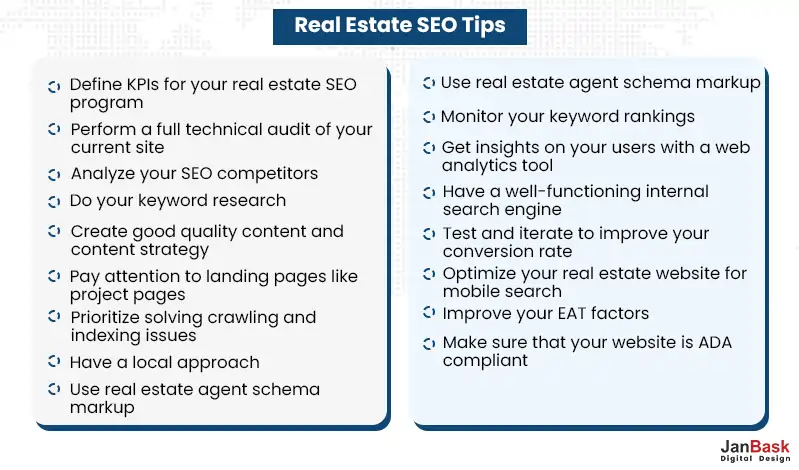Unlock the secret to dominating the real estate market with these top SEO techniques that will boost your online presence.

Image courtesy of via DALL-E 3
Table of Contents
Introduction to SEO for Real Estate Companies
SEO stands for Search Engine Optimization. It’s like giving your website a special coat that makes it easier for people to find it on the internet. Real estate companies, which help people find their dream homes, can benefit greatly from using SEO techniques. By making their websites more visible, real estate companies can attract more potential customers and grow their business.
What is SEO?
SEO is all about making sure that when someone searches for something on a search engine like Google, your website shows up at the top of the results. This is important because most people only click on the first few links they see. So, the higher your website appears in the search results, the more likely people are to visit it.
Why Real Estate Companies Need SEO
Real estate companies need SEO to reach more people who are looking to buy or sell homes. By using SEO techniques, companies can make sure that when someone searches for “dream home in [city name],” their website pops up. This means more people will see their listings and have a higher chance of working with them to find their perfect home.
Understanding Keywords
Keywords are like the secret codes that unlock the treasure chest of the internet. When you type something into a search engine like Google to find information, you’re using keywords. These are the important words or phrases that help search engines like Google understand what you’re looking for. For real estate companies, using the right keywords is crucial for attracting potential customers who are searching for homes online.
What Are Keywords?
Keywords are the magic words that help search engines match your website with what people are searching for. Imagine you’re looking for a new home in a specific area. You might type in keywords like “3-bedroom house for sale in XYZ neighborhood” to find relevant listings. For real estate companies, using keywords like “real estate listings” or “buy a house” can help connect them with people looking to purchase property.
Choosing the Right Keywords
When real estate companies are selecting keywords for their website, it’s important to think like a potential homebuyer. Consider what words or phrases someone might use when searching for a property. Using location-specific keywords like city names or neighborhood descriptions can help target a specific audience. Additionally, including terms like “real estate agent” or “home for sale” can attract those actively seeking assistance in buying or selling homes.
On-Page SEO Techniques
When it comes to improving your real estate company’s online visibility, on-page SEO techniques play a crucial role. By optimizing your website content, meta tags, and keyword placement, you can attract more potential customers and boost your search engine rankings.

Image courtesy of www.janbaskdigitaldesign.com via Google Images
Optimizing Content
Having high-quality and relevant content on your real estate website is essential for SEO. Make sure your website provides valuable information about the properties you offer, neighborhood details, and helpful resources for home buyers and sellers. Regularly updating your content can also signal to search engines that your site is active and relevant.
Using Meta Tags
Meta tags are snippets of text that describe a page’s content. Including relevant keywords in your meta tags can help search engines understand what your page is about and improve its visibility in search results. Make sure to write compelling meta titles and descriptions that accurately represent the content on each page of your website.
Keyword Placement
Strategically placing your target keywords throughout your website content is essential for on-page SEO. Include your keywords in the page titles, headings, meta tags, and within the body of your content. However, be sure not to overuse keywords, as this can be seen as spammy by search engines. Focus on creating natural and well-written content that incorporates your keywords in a meaningful way.
Off-Page SEO Techniques
When it comes to boosting your real estate website’s visibility on search engines, off-page SEO techniques play a crucial role. These strategies focus on improving your site’s authority and credibility across the web. Here are some key off-page SEO techniques that can help your real estate company stand out.
Building Backlinks
Backlinks are links from other websites that direct traffic to your site. When reputable sites link back to your content, search engines view your site as more trustworthy and valuable. This can lead to higher rankings in search results. As a real estate company, you can build backlinks by creating high-quality content that other sites find valuable and want to link to. Additionally, guest posting on reputable real estate blogs or partnering with local businesses can also help generate backlinks to your site.
Social Media Sharing
Social media platforms like Facebook, Instagram, and Twitter can be powerful tools for enhancing your off-page SEO. By sharing your real estate listings, blog posts, and other content on social media, you can increase brand awareness and drive traffic to your website. When users engage with your content by liking, sharing, or commenting on it, it can improve your site’s visibility and credibility in the eyes of search engines. Remember to use relevant real estate hashtags and geotags to target local audiences and maximize your reach.
Local SEO Strategies
When it comes to real estate, location is everything. That’s why optimizing your website for local searches is crucial in attracting potential homebuyers. Let’s dive into the world of Local SEO strategies and how they can benefit your real estate company.

Image courtesy of www.janbaskdigitaldesign.com via Google Images
Importance of Local SEO
Local SEO is all about making sure your real estate company shows up in search results when people are looking for homes in specific areas. When someone searches for “real estate agent near me” or “homes for sale in [your city],” you want your website to be one of the first results they see. By optimizing for local searches, you can reach potential clients who are actively looking to buy or sell properties in your area.
Optimizing Google My Business Listing
One of the most important steps in local SEO is setting up and optimizing your Google My Business profile. This free tool allows you to manage how your business appears on Google Search and Maps. Make sure your listing includes accurate information about your real estate company, such as your address, phone number, business hours, and website. Encourage satisfied clients to leave positive reviews, as this can help improve your local search ranking.
Getting Local Reviews
Positive reviews from local clients can greatly impact your local SEO efforts. When potential homebuyers see that others have had a good experience working with your real estate company, they are more likely to trust and contact you. Encourage satisfied clients to leave reviews on platforms like Google, Yelp, and Facebook. Responding to reviews, both positive and negative, shows that you value feedback and care about providing excellent service.
Mobile SEO
In today’s digital age, more and more people are using their smartphones to browse the internet and search for information. For real estate companies, this means that having a mobile-friendly website is crucial to reaching potential customers. Let’s explore why mobile SEO matters and how to ensure your website is optimized for mobile devices.
Why Mobile SEO Matters
Did you know that over 60% of internet searches are now done on mobile devices? This means that if your real estate website is not mobile-friendly, you could be missing out on a significant number of potential clients. When someone is looking for a new home, they want a website that is easy to navigate, loads quickly, and looks great on their phone. If your site doesn’t meet these criteria, you may lose valuable leads to competitors with mobile-optimized websites.
Making Your Site Mobile-Friendly
So, how can you ensure that your real estate website is mobile-friendly? Here are a few tips to help you get started:
1. Use a responsive design: Make sure that your website is built using a responsive design that automatically adjusts to fit any screen size, whether it’s a smartphone, tablet, or desktop.
2. Optimize for speed: Mobile users expect websites to load quickly, so make sure to optimize your site for speed by compressing images, minimizing code, and using a content delivery network.
3. Simplify navigation: Keep your website navigation simple and easy to use on a small screen. Use clear menus, buttons, and font sizes to make it effortless for users to find what they’re looking for.
By following these tips and ensuring that your real estate website is mobile-friendly, you can attract more mobile users, improve your search engine rankings, and ultimately drive more business to your company.
SEO Performance Tracking
Tracking the performance of your SEO efforts is crucial to ensure that you are on the right track and making progress in improving your website’s visibility. By monitoring and analyzing the data, you can identify areas that need improvement and make informed decisions to enhance your SEO strategy.

Image courtesy of www.inman.com via Google Images
Using Tools to Track SEO
There are various tools available that can help you monitor the performance of your SEO efforts. Tools such as Google Analytics, SEMrush, and Moz can provide valuable insights into how your website is performing in terms of search engine rankings, traffic, and user engagement. These tools can help you track key metrics, such as organic traffic, keyword rankings, and backlink profile, to gauge the effectiveness of your SEO strategy.
Analyzing the Results
Once you have collected data using these tools, it is essential to analyze the results to understand what is working well and what needs improvement. Look for trends, patterns, and correlations in the data to identify areas where you are excelling and areas where you are falling short. By interpreting the data effectively, you can gain a better understanding of how your SEO efforts are impacting your website’s performance.
Making Improvements
Based on the insights gained from analyzing the data, you can make informed decisions on how to enhance your SEO strategy. Whether it’s optimizing your website’s content, improving your backlink profile, or refining your keyword strategy, the data collected from SEO tracking tools can help you prioritize areas for improvement and make targeted changes to boost your website’s search engine rankings.
Common SEO Mistakes to Avoid
One of the most common mistakes that real estate companies should avoid when it comes to SEO is keyword stuffing. Keyword stuffing is when you excessively use keywords in your content in an attempt to manipulate search engine rankings. This can make your content sound unnatural and lower the quality of your website. It’s essential to use keywords strategically and naturally to enhance your SEO efforts.
Ignoring Mobile Users
Another significant mistake to avoid is ignoring mobile users. In today’s digital age, a large portion of internet traffic comes from mobile devices such as smartphones and tablets. If your real estate website is not optimized for mobile users, you could be missing out on valuable leads and potential clients. Make sure your site is mobile-friendly to provide a positive user experience across all devices.
Overlooking Local SEO
Real estate companies often make the mistake of overlooking local SEO. Local SEO is crucial for businesses that serve specific geographic areas, like real estate agencies. By optimizing your website for local searches and creating a Google My Business listing, you can increase your visibility in local search results and attract more potential buyers or sellers in your area. Don’t underestimate the power of local SEO in driving targeted traffic to your website.
Summary
In this blog post, we covered essential SEO techniques for real estate companies to help them attract more customers and improve their online visibility. Here is a recap of the main points discussed in each section:

Image courtesy of rockcontent.com via Google Images
Introduction to SEO for Real Estate Companies
SEO, or search engine optimization, is crucial for real estate companies to use to reach more people looking for homes. By optimizing their websites, real estate companies can attract more customers.
Understanding Keywords
Keywords are important words or phrases that people type into search engines when looking for information. Choosing the right keywords is key to improving a real estate website’s SEO.
On-Page SEO Techniques
Optimizing content with high-quality information, using meta tags effectively, and placing keywords strategically within the content can significantly improve on-page SEO for real estate websites.
Off-Page SEO Techniques
Building backlinks from other sites and utilizing social media for content sharing are effective strategies to improve off-page SEO for real estate companies.
Local SEO Strategies
Optimizing for local searches is crucial for real estate companies, especially when people are searching for homes in specific areas. Setting up a Google My Business profile and getting good local reviews can boost local SEO.
Mobile SEO
Ensuring that the real estate website is mobile-friendly is essential, as many people use their smartphones to search for homes. Making the site mobile-friendly is key to attracting mobile users.
SEO Performance Tracking
Using tools to track SEO performance, analyzing the results, and making improvements based on insights gained are essential steps to monitoring and enhancing SEO efforts for real estate companies.
Common SEO Mistakes to Avoid
Avoiding common mistakes such as keyword stuffing, ignoring mobile users, and overlooking local SEO can help real estate companies improve their SEO strategies and attract more customers.
Want to turn these SEO insights into real results? Seorocket is an all-in-one AI SEO solution that uses the power of AI to analyze your competition and craft high-ranking content.
Seorocket offers a suite of powerful tools, including a Keyword Researcher to find the most profitable keywords, an AI Writer to generate unique and Google-friendly content, and an Automatic Publisher to schedule and publish your content directly to your website. Plus, you’ll get real-time performance tracking so you can see exactly what’s working and make adjustments as needed.
Stop just reading about SEO – take action with Seorocket and skyrocket your search rankings today. Sign up for a free trial and see the difference Seorocket can make for your website!
FAQs
What is SEO?
SEO stands for Search Engine Optimization, which is a way to make your real estate website more visible on the internet. It helps people find your website when they search for homes or real estate services online.
Why do Real Estate Companies Need SEO?
Real estate companies need SEO to reach more people who are looking to buy or sell homes. By optimizing their websites with SEO techniques, they can attract more customers and stand out from competitors in the online world.
What Are Keywords?
Keywords are important words or phrases that people type into search engines when they are looking for information. In the case of real estate websites, using the right keywords can help potential customers find your website more easily.
How do you Choose the Right Keywords for a Real Estate Website?
When choosing keywords for a real estate website, you should think about what words or phrases potential customers might use when searching for homes. It’s essential to pick keywords that are relevant to your services and have a good search volume to attract more traffic to your site.
What is the Importance of Local SEO for Real Estate Companies?
Local SEO is crucial for real estate companies because it helps them show up in search results when people are looking for homes in specific areas. By optimizing for local searches, real estate companies can target potential customers in their local area and increase their chances of getting leads.







